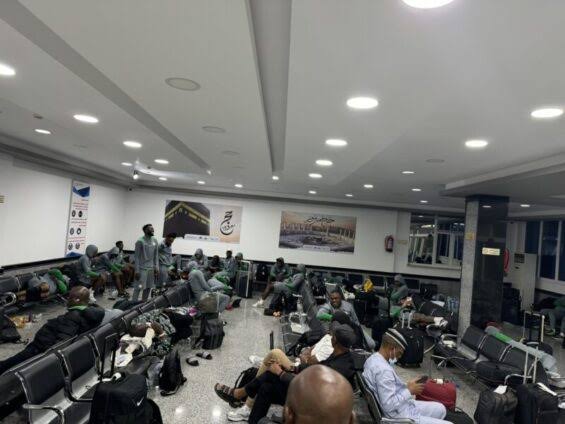Tensions between Nigeria and Libya have escalated following the Confederation of African Football’s (CAF) verdict on the ill-treatment of the Super Eagles in Libya.
The Nigerian football team was detained at the Al-Abraq Airport for over 20 hours, sparking widespread outrage and prompting the Nigeria Football Federation (NFF) to withdraw from the qualifying match and file a complaint with CAF.
The disciplinary committee of CAF awarded Nigeria three points and three goals for the abandoned match, ruling that the Libyan Football Federation breached regulations and ordering them to pay a $50,000 fine. However, the Libyan Football Federation President, Nasser Al-Suwai’I, described the verdict as “unjust and malicious” and plans to appeal.
In response to the CAF ruling, Libyan media outlets have incited hostility towards Nigerian workers, calling for their arrest and deportation. A popular Libyan news blog posted, “All Libyan TV channels are urging the government to arrest the Nigerian workers who are working here in Libya without legal papers. They have to pay $500 plus taxes.”
Adenaike Emmanuel, a Nigerian living in Tripoli, confirmed the arrests began on Sunday after the CAF statement was released. “They have already started… They believe that by doing this, they are getting their revenge.” Peter Omoregbie, President of the Nigerian community in Libya, also reported arrests in Tedora, stating, “They are arresting innocent people. They don’t even care whether you have passports or residence permits.”
The Chairman of the National Institution for Human Rights in Libya, Ahmed Hamza, warned against retaliatory acts targeting Nigerian workers. “We warn against any form of retaliation against foreign and migrant workers in Libya, especially Nigerian workers, by security forces, armed groups, or citizens.”
Former Nigerian ambassador to Mexico, Ogbole Amedu-Ode, urged the Federal Government to investigate the arrests and report Libya to the African Union. “If Nigerians collate evidence of the maltreatment, the Federal Government can protest directly to the Libyan government over what Nigerians are facing.”
The Nigerian government has been called upon to intervene and protect its citizens in Libya. The situation remains tense, with many Nigerians living in fear of arrest and deportation.


